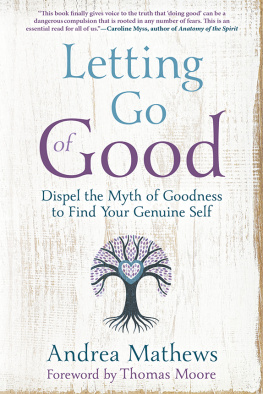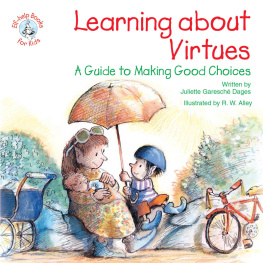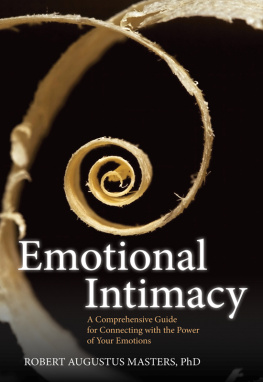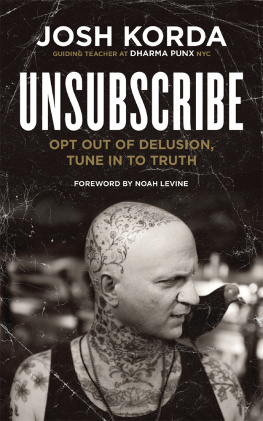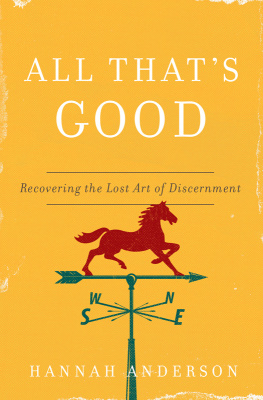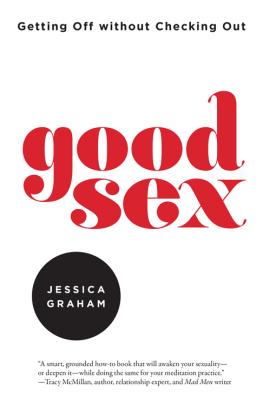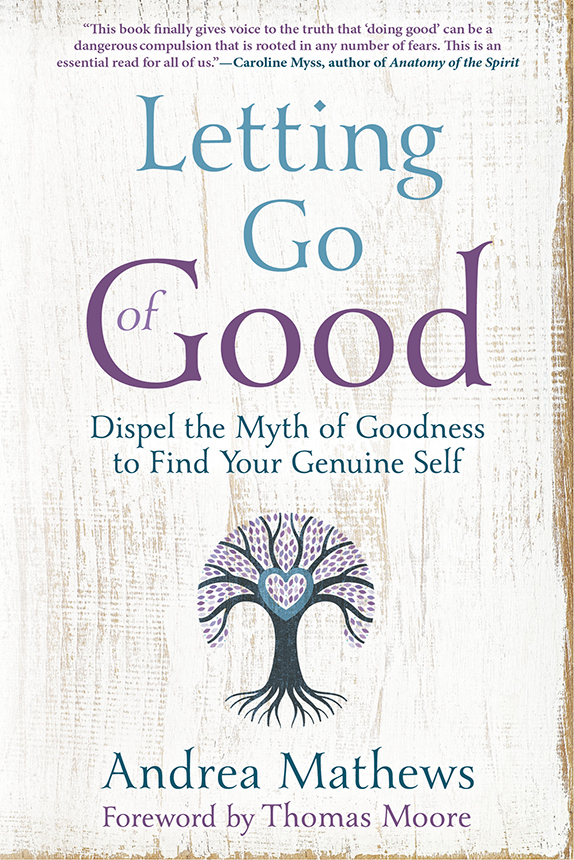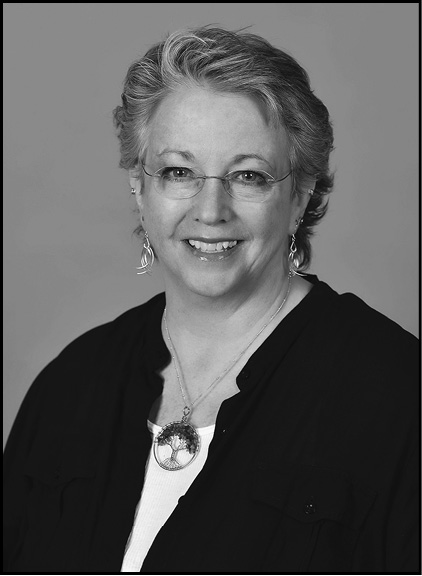Andrea Mathews has over thirty years of experience in the mental health and human services field providing and supervising others in the provision of therapy. Shes also a professional trainer and motivational speaker, frequently providing counselor training and offering individual and group coaching in authentic leadership, conflict resolution, authentic relationships, and more. Andrea is the host of the popular radio show Authentic Living . She lives in Birmingham, Alabama, and can be found online at www.andreamathews.com.

Llewellyn Publications
Woodbury, Minnesota
Copyright Information
Letting Go of Good: Dispel the Myth of Goodness to Find Your Genuine Self 2017 by Andrea Mathews.
All rights reserved. No part of this book may be used or reproduced in any matter whatsoever, including Internet usage, without written permission from Llewellyn Publications, except in the form of brief quotations embodied in critical articles and reviews.
As the purchaser of this e-book, you are granted the non-exclusive, non-transferable right to access and read the text of this e-book on screen. The text may not be otherwise reproduced, transmitted, downloaded, or recorded on any other storage device in any form or by any means.
Any unauthorized usage of the text without express written permission of the publisher is a violation of the authors copyright and is illegal and punishable by law.
First e-book edition 2017
E-book ISBN: 9780738753256
Book design by Bob Gaul
Cover design by Lisa Novak
Editing by Aaron Lawrence
Llewellyn Publications is an imprint of Llewellyn Worldwide Ltd.
Library of Congress Cataloging-in-Publication Data (Pending)
ISBN: 978-0-7387-5223-5
Llewellyn Publications does not participate in, endorse, or have any authority or responsibility concerning private business arrangements between our authors and the public.
Any Internet references contained in this work are current at publication time, but the publisher cannot guarantee that a specific reference will continue or be maintained. Please refer to the publishers website for links to current author websites.
Llewellyn Publications
Llewellyn Worldwide Ltd.
2143 Wooddale Drive
Woodbury, MN 55125
www.llewellyn.com
Manufactured in the United States of America
Disclaimer
The publisher and the author assume no liability for any injuries caused to the reader that may result from the readers use of content contained in this publication and recommend common sense when contemplating the practices described in the work.
Authors Note
It is very easy to blame and judge parents, family, and primary caregivers for our circumstances. This book is not meant to blame or judge. Rather it is meant to facilitate awakening to conscious responsibility for ones own actions, reactions, thoughts, and feelings. It is by taking such responsibility that we can become whole authentic people. While we must look at the conscious and unconscious actions of those in our families of origin in order to understand how we developed our particular identifications, this book is meant to enable us to look past the age-old good and bad paradigm (which commonly includes blame and judgment) to a paradigm that helps us distinguish between the false identity and the true Self.
Since this book is meant to support an awakening, it may be used as a form of individual study or in combination with therapy. But it is not meant to substitute for therapy where therapy is needed.
The named characters found in this book are fictionalized from composite samplings of my experience as a mental health clinician. Though their issues are drawn from an amalgamation of case histories, they should not be seen as actual individuals, couples, or families with whom I have worked. My work with clients is always confidential.
Acknowledgments
Years of experience went into the writing of this book. So, first I want to thank all of the many people I have known in my life who have shared their journeys with me, particularly those who have supported me in my own journey to wholeness. Whether my personal experience with you was difficult or easy, I gained tremendously from our encounter, and I thank you. I give special thanks to Thomas Moore for his encouragement of my writing and his enthusiasm about this particular topic. As always I so appreciate his wisdom, some of which he graciously put into the foreword of this book. I thank Leslie West for her enduring support and encouragement that absolutely never, ever fails. I thank my family for our collective genetic writing capacities, which enable me to continue to writethus fulfilling one of my deepest and most sincere desires. I thank my agent, Krista Goering, for her time, effort, and willingness to help me get this book out there. And finally, I want to thank Angela Wix for her untiring efforts to help me make this into the book it has become.
Contents
by Thomas Moore
- : Why We Need to Let Go of Good
and Learn to Be Genuine Instead - 2 Understanding Projection, Introjection, and the
Good-Guy Identity - 3 Reinforcements:
Empathy and Bargaining - : Becoming Aware of the Falsehoods
That Hold Us Back - 5 Give Them the
Benefit of the Doubt - 7 Lifes Purpose
Is Helping Others - 13 You Are Responsible
for How I Feel - 20 When the Good
Guy Misuses Others - : Healing: Making Friends
with Difficult Emotions - 21 Understanding
the Inner World: Your
Internal Messaging System - : Healing: Making Friends
with Your Personal Powers - : What to Expect from
the Overall Healing Process - 29 The Differentiation/
Integration Process - 30 Practice That
Becomes Process
I grew up in an Irish-Catholic family in the 1940s and then in the 50s, at thirteen, I went off to a Catholic seminary with the idea of becoming a priest. I developed the biggest good boy complex imaginable. Andrea Mathews has done a remarkable job describing this complex, which she defines as a good-guy identity , exploring its many facets, and offering guidance on working with and healing it. She writes clearly and with special insight into the many ways the good person habit can infect a life. But, as a form of introduction to her brilliant and beautiful study, Id like to say something about it from my point of view.
With my background in Jungian and archetypal psychology, I see the good person complex as a subpersonality of the psyche, as a figure who often takes you over and whose voice you often use and whose manner becomes your own for the duration of the possession. Yes, it feels at times that you are possessed by this good person and can do little to edge him out.
I appreciate Andrea Mathews early on in the book pointing out that the emphasis we and our society place on being good equally emphasizes what we perceive as being bad. You dont want to be the bad person and that fear sets up a split in you between the good and the bad. I remember my mother, who was a wonderful and loving person, telling me often not to be bold, her keyword for any kind of self-assertiveness and speaking up for myself. Later in life she felt she had been wrong to do this and we had many intimate conversations about it that helped me. Still, I learned as a child that assertive people were somehow bad, and I shouldnt be like them.

